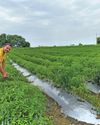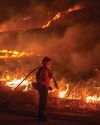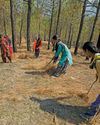
AFTER DEFICIT rainfall led to a poor maize harvest in the summer cropping season November-March, Tinashe of Kubara has another chance. The 31-year-old farmer from Stoneridge area on the outskirts of Zimbabwe's capital city Harare set up a borehole-based irrigation facility on his farm towards the end of March by spending US $2,500 and planted maize again. "With rain-fed farming, it would not have been possible to plant again after a crop failure," says Kubara. He has also set aside two-thirds of his 1.2 hectare (ha) for growing vegetables. Kubara is one of the tens of thousands of Zimbabwean farmers who are embracing irrigation for the first time.
Irrigation has remained largely alien to Zimbabwe's 1.5 million smallholder farmers (farms under 10 ha), who make up to 70 per cent of the country's farmers and produce more than 50 per cent of the country's food, says an agronomist in the country, requesting anonymity. In the 1960s, when the government introduced irrigation schemes, few farmers opted for them since rains were dependable, he adds. Till 1999, the country was a net exporter of grains.
Erratic rains have severely affected Zimbabwe's traditionally rain-fed farming system with disastrous results for the landlocked nation's agro-based economy, which now struggles to produce even half of the country's food requirements.
Denne historien er fra September 01, 2022-utgaven av Down To Earth.
Start din 7-dagers gratis prøveperiode på Magzter GOLD for å få tilgang til tusenvis av utvalgte premiumhistorier og 9000+ magasiner og aviser.
Allerede abonnent ? Logg på
Denne historien er fra September 01, 2022-utgaven av Down To Earth.
Start din 7-dagers gratis prøveperiode på Magzter GOLD for å få tilgang til tusenvis av utvalgte premiumhistorier og 9000+ magasiner og aviser.
Allerede abonnent? Logg på

THE CIRCULARITY ARGUMENT
A circular economy can help India achieve its developmental aspirations while following the low-carbon pathway. It will also help address the challenges of waste management, pollution and overexploitation of natural resources. Industries are already innovating to reuse high-volume wastes and have shown that the transition can usher in both environmental and financial windfalls

Banking on flawed drug voluntary licences
The Medicines Patent Pool is pushing for more VLs, but its bad deal with Novartis on a cancer drug shows the pitfalls

Lasting solutions
For the first time, the UN has recognised the role of indigenous communities in tackling aridity. A repository of traditional knowledge India has the wherewithal to lead the way

IMD at 150
India's journey into modern weather forecasting took a decisive turn 150 years ago with the establishment of India Meteorological Department during the British rule. The agency has come a long way since then, shaping the way the country predicts and responds to its diverse climate challenges

Every drop counts
In drought-prone Marathwada region, 14 villages have managed to counter water shortage by budgeting the resource

Threat to survival
Hollongapar Gibbon Sanctuary in Assam faces ecological challenges as railway electrification and hydrocarbon exploration endanger its fragile biodiversity

'Migration is going to be a battlefield'
AMITAV GHOSH is one of the foremost chroniclers of our times. His literary sojourn includes writings on topics that range from languages to climate change to human lives. His latest book, Wild Fictions, brings some of his works on these issues under one title. In a conversation with RAJAT GHAI, Ghosh shares his views on the future of human movement. Excerpts:

Face of future
California wildfires confirm forest fires are intensifying in a hotter world, emitting substantial amounts of greenhouse gases and reinforcing global warming

Friends of the forest
Residents of 30 villages in Uttarakhand establish a model for public participation in saving forests from wildfires

Climate-crazy playbook
Just hours after his second (and final) term began on January 20, US President Donald Trump unleashed 46 presidential actions. Several of these are centred on the US' climate commitments, energy transition, migration and trade policies, and are likely to have negative global implications